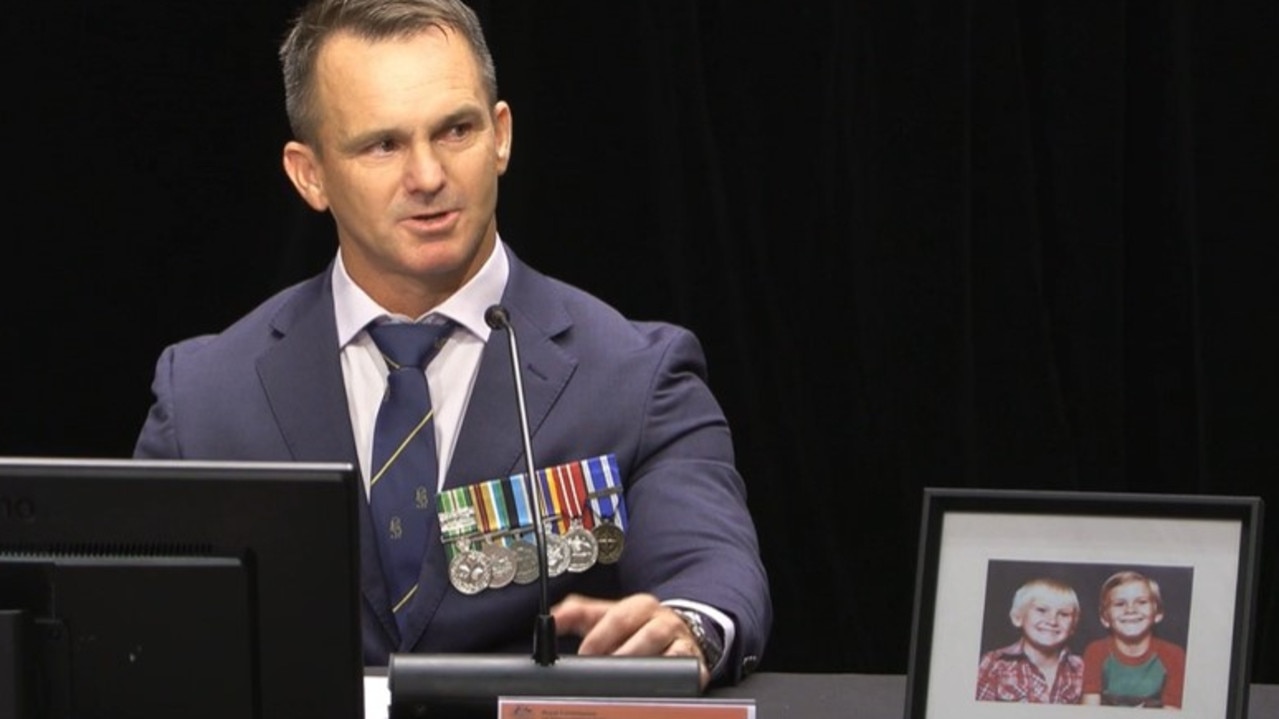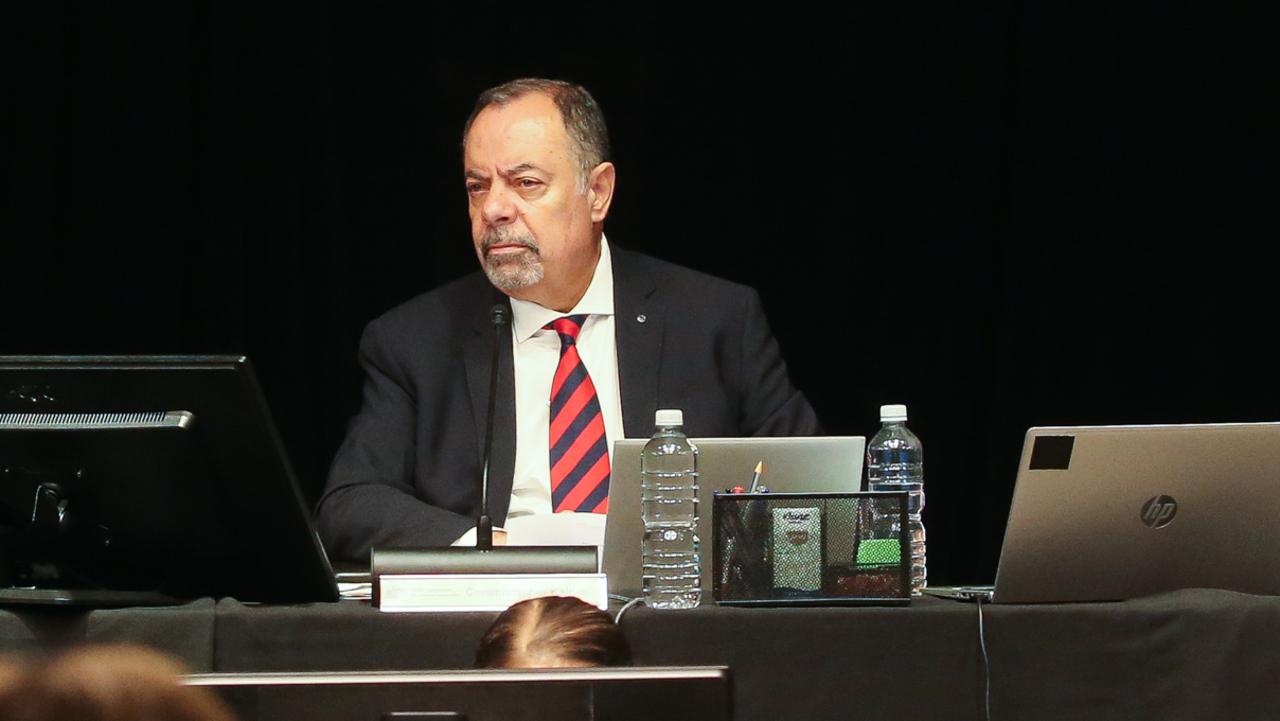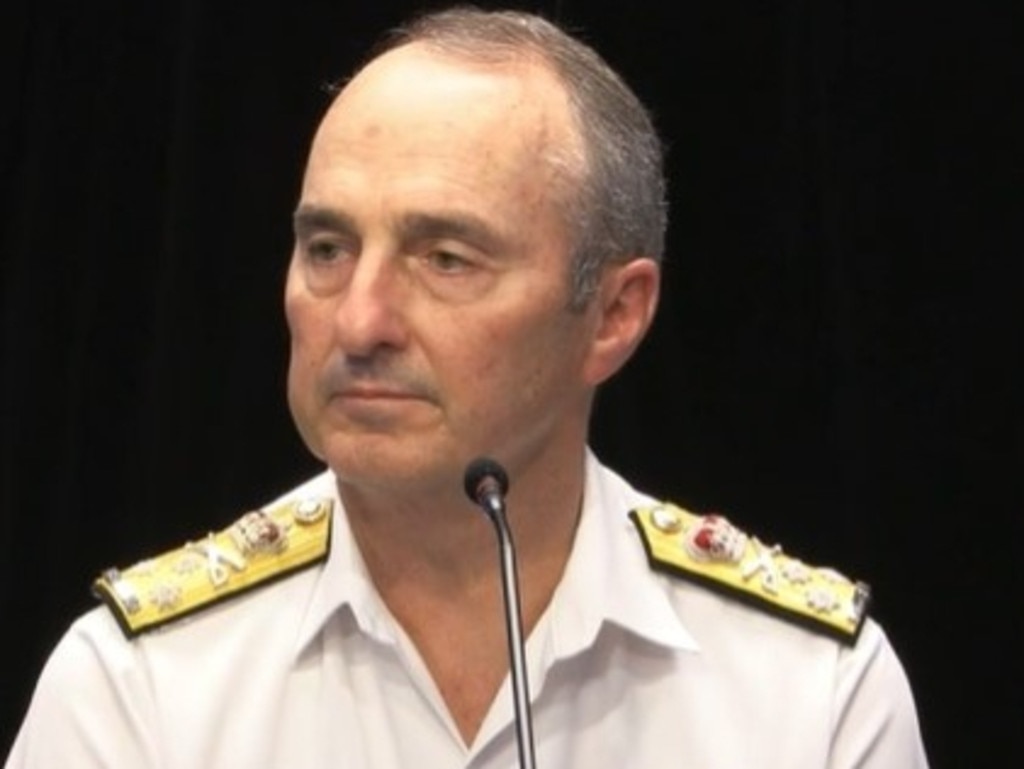Navy hero John Armfield reveals secret report into brother’s suicide in shocking royal commission testimony
A navy diver has made shocking claims to a royal commission after he was sent a secret report into his brother’s suicide.
A navy clearance diver who served Australia in Afghanistan was left alone sobbing in his car after picking up a secret defence report into his brother’s suicide as allegations of serious failures in the ADF’s mental health culture continue to mount.
Ex-diver John Armfield, testifying before the Royal Commission into Defence and Veteran Suicide on Wednesday, said he found out about an internal inquiry into the October 2011 death of his younger brother, RAAF Leading Aircraftman Andrew Armfield, 10 years after the traumatic event.
But when the report was made available to him, he told the commission how he drove to the post office to pick it up without any support in place to help him process the findings, which he said revealed serious failures in his brother’s care.
“I was sitting in my car, broken,” he said, with tears filling his eyes.
“I’d loyally served my nation and this is how they’d given me the report on my little brother’s death.
“I sat there and sobbed. I couldn’t take it home to my family.

“The contents of that report, the comments relating to my brother, I believe the inquiry officer at the time did a very good job.
“He outlined the issues.”
Mr Armfield told the commission the navy had apologised to him for the “failings” that may have led to Andrew’s death.
“There were so many failings admitted to me,” Mr Armfield said.
Mr Armfield said he had “no idea” about his brother’s mental health struggles and when he was informed Andrew had self-harmed and tried to take his own life, his world “flipped” upside down.
“I wrote numerous emails requesting support for my brother and there was no response … he was in isolation,” Mr Armfield said.
The contents of the report were not publicly aired during the testimony, but Mr Armfield said severe understaffing in mental health support was one factor that may have contributed to his brother’s death.
The diver also flagged an issue with alcohol and said his brother should not have been allowed access to liquor in his room.
He said he was not informed at the time about the report’s existence or its outcome.
Mr Armfield said he had “struggled” to get hold of the report, which he found out about through the royal commission, and said he felt “angry” about the bureaucratic obstacles he had faced to get to the truth about what happened to his brother.
The commission was also told how Mr Armfield allegedly confronted a hostile culture when he flagged concerns about his brother’s care to his superiors.
In one instance, the diver, who wore a jacket with medals on his chest and sat before a photo of Andrew as a young boy, discovered files on his brother’s death on an internal defence storage system.
“All this was sitting on Objective (the storage system) and accessible to me,” he said.
“I was very torn and emotional that this was there.”
When he raised concerns about possible privacy breaches to his commanding officers, he said he was threatened with potential criminal charges for illegally accessing the system.

Mr Armfield was cleared of any wrongdoing but only after nine months of what he called stress and hardship. He faced the possibility of a criminal proceeding, telling his wife at one point that if he was arrested, he wanted her to film it and send it to the media.
The diver and recruiter, who spent 20 years in the military before leaving in 2023, also says defence tried to dodge accountability for its alleged failure to properly care for his brother.
When he wrote a letter of complaint to the navy about its handling of his brother’s care, he received a letter referring him away from defence and back to the royal commission.
“I appreciate this is a very troubling matter for you and note that your brother’s case is being considered by the RCDVS,” the letter states.
“As the RCDVS would, at present, be the appropriate forum to refer this aspect of your complaint to, I am unable to assist further with this aspect at this time.
“Defence has been legally compelled to provide information, including the inquiry report you refer to, to the royal commission.
“I encourage you to continue to avail yourself of the support mechanisms you need to deal with this challenging situation.”
Mr Armfield blasted what he called a “two-tiered culture” in the military, with one set of rules for enlisted members and another for the officer class.
“You have to be accountable for your actions,” he said.
“I’ve fought the system for 2½ years.
“That is the issue, there is no accountability.”
He said after his experiences in the past three years, he would now only advise his two sons to join the military as officers rather than enlisted servicemen.
Mr Armfield said Commonwealth lawyers had redacted the names of the public officials he had contacted during his struggles with defence, though it’s understood he had met with some of the highest serving members of the federal government and Liberal opposition.
When asked by the commissioners for specific recommendations for change, Mr Armfield said defence needed “new leadership” and “the people who did this to me need to be made an example of”.
“What do I want? I don’t want this to happen to anyone else,” he said.
“You do something about this or I will.
“This is my little brother, it’s not going away.”

Commission chair Nick Kaldas thanked Mr Armfield and said his statement and story would help the commission “greatly”.
In a speech to the National Press Club in September last year, Mr Kaldas said the investigation into the suicide crisis roiling Australia’s military community had been “stymied and stonewalled” by defence and government bureaucracy.
“Despite the government establishing a royal commission and the legislature wanting certain issues investigated, obtaining critical information from Commonwealth bodies in a timely manner has been difficult,” he said.
“Our success will require government and its agencies, including the ADF, defence and DVA, to, once and for all, get on-board and act.”
Deaths by suicide have taken the lives of 1600 servicemen and women between 1997 and 2020 or 20 times the number of service personnel killed on active duty.
VICE ADMIRAL DEFENDS SAFEGUARDS
Vice Admiral David Johnston AC, the Vice Chief of the Defence Force, testified before the commission on Wednesday evening and defended the complex accountability measures he and other senior defence leaders face in their work to defend the country.
The commission heard how the leadership’s “corporate plan”, “strategic accountability table” and “military enabling domain provisions” outlined the outputs, or performance criteria, expected from the nation’s top brass by the government.

“There are measures that exist that describe the outputs,” Vice Admiral David Johnston said.
“The corporate plan is the primary one that would express those in a number of areas.”
Erin Longbottom KC, counsel assisting the commission, pressed the vice admiral and asked whether there might be a lack of sufficient external accountability mechanisms in place for senior leadership.
But the vice admiral said his responsibilities and the measurement of those responsibilities were clear.
“I meet with the CDF (chief of defence force) nearly every day where we are dealing with the issues of delivering my responsibilities,” he said.
Ms Longbottom also proposed senior leadership may have failed to properly address alleged “systemic weakness” in the military’s assurance system for military justice, citing an apparent lack of citations in high-level meeting minutes on the issue.
But the vice admiral did not accept her proposition and said the issued was raised and discussed by leadership.




